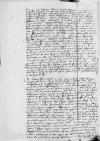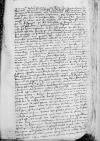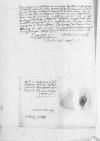Letter #1118
Cornelis DE SCHEPPER to Ioannes DANTISCUSPrague, 1534-02-13
English register:
Since his letter from Vienna, De Schepper has received two letters from Dantiscus. The letter of 14 October 1533 reached him on 21 December in Monzón. The one of 11 January 1534 he found on his return from Spain in Prague on 5 February 1534.
De Schepper successively responds to both letters. He is grateful for Dantiscus' congratulations on his safe return from Constantinople. He needs to keep his reply brief because the next day he is leaving again for Constantinople. During his short stay in Spain he was unable to carry out Dantiscus' commission concerning Isope [Isabel Delgada] and Juana [Dantisca], but Godschalck Ericksen will ensure that everything is arranged via the Welsers. The most appropriate intermediary among the Welsers in Spain is no longer Ulrich Ehinger, but Hieronymus Sailer. Juana will travel on the first fleet after the winter, and will be received by De Schepper's wife [Elisabeth Donche] in Bruges before sailing to Prussia. He himself returned from Spain to Germany through Burgundy. Hieronymus Sailer had already been informed of Dantiscus' request by the Welsers’ factor [Albrecht Cuon]. Therefore Dantiscus can be assured that everything will go smoothly.
In his second letter Dantiscus reported that he had been informed by the Archbishop-Elect of Lund [Johan Weze] that De Schepper had sent him a letter after his return from Turkey. De Schepper confirms that he entrusted this letter to Karl Koczer, along with his letters to the Queen of Poland [Bona Sforza], the Bishop of Przemyśl Jan Chojeński and Count Jan Tarnowski. When asked for an explanation why the letter to Dantiscus had not reached its destination, Koczer assured him that he had sent it to Thorn, as he should have done. De Schepper therefore suspects that his letter was intercepted, and can only condemn this practice. Anyway, the letter contained nothing that was untrue or inappropriate.
The Archbishop's of Lund news about the reward received by De Schepper from the King of the Romans [Ferdinand I] is correct. The Emperor [Charles V] himself showed his appreciation by appointing him [supernumerary] member of the Privy Council of Queen Mary [of Hungary]. He stresses that he does not aspire to great fortune and is satisfied with what he can achieve. He is grateful to Dantiscus for his friendliness. He was only able to spend a few days in Bruges with his infant son [Cornelis jr.] and his wife.
When he returns safely from his forthcoming mission he wants to retire, but without deserting his princes or homeland. Then he will write more frequently to Dantiscus. Before his return from Constantinople it will be impossible to write, but his thoughts will be with his family and with Dantiscus. Dantiscus can count on De Schepper for transferring his daughter Juana to Antwerp.
He responds to Dantiscus' news about Lübeck and the shipwreck of the Netherlandish merchant fleet. According to the report of the Amsterdam merchant Pompeius Occo to the Archbishop of Lund, only a few ships have perished. The vast majority of the Dutch ships have safely returned to port, carrying a huge load of grain from Gdańsk.
The Emperor stayed in Monzón with the delegates of the Kingdoms of Aragon, Valencia and Catalonia until 30 December. He used his time to set things right in these Kingdoms and attained the desired result. The three Kingdoms voluntarily donated 600,000 ducats to him. The Emperor managed to settle numerous private conflicts and also some Inquisition issues, and clamped down on the private wars among noblemen. After having assisted at the closing session of the Cortes, the Emperor left for Zaragoza, where on 31 December he joined the Empress [Isabella of Portugal], who is pregnant.
De Schepper left on January 1 from Monzón. In Bellpuig he met the Lord of Nassau [Hendrik III of Nassau-Breda] with his wife the Marchioness [Mencía de Mendoza]. When travelling through France their escort exceeded that of the French King [Francis I] himself. The latter was returning from Marseille where the marriage had been celebrated between his second son, the Duke of Orleans [Henry II of Valois], and the grandniece [Catherine de' Medici] of the Pope [Clement VII], both barely 14 years old. In order to prevent his cousin from being sent back, as once happened to Margaret of Austria, the Pope and the King were eyewitnesses to the actual consummation of the marriage. The stipulations of the agreement between Pope and King were not disclosed, but it can be assumed that the Pope wants the Duke of Orleans to be the ruler of Italy. His first move is to induce the French King to claim the Duchy of Urbino for his son, as part of the dowry. The Pope is also willing to cede other Italian cities. De Schepper wonders what the reaction of the Emperor will be.
In Germany there was a meeting of the envoys of the Swabian League. Young Christoph of Württemberg strives to regain his right of succession to his Duchy.
In the Indies [America] large gold deposits have been discovered. The first cargo that has arrived is just the prelude to even greater riches. The Emperor is entitled to one fifth of the revenue.
Dantiscus' Spanish friends were relieved when the rumour of his death was dispelled. In Bohemia only the Count [Leonardus] de Nogarola and Jiři Žabka are left. De Schepper’s letter is accompanied by a letter from Petrus [Mirabilis], Dantiscus' former steward, who is now in the service of [Nicolas Perrenot de] Granvelle.
De Schepper is pleased that Campensis will be able to devote himself to his studies. He sends Dantiscus a copy of the Lyon edition of his Paraphrasis. As he is approaching such a difficult enterprise, he recommends himself to Dantiscus' prayers. He conveys greetings to Dantiscus' family and promises that his colleague the Archbishop of Lund will look after the affairs of Dantiscus' brother-in-law [Johann Reyneck] during his absence. The next day he leaves for Constantinople; he will meet Alvise Gritti en route.
| received [1534]-03-24 Manuscript sources:
Early printed source materials:
Prints:
| ||||||||||||||||||||||||||||||||||||
Text & apparatus & commentary Plain text Text & commentary Text & apparatus
Reverendissimo in Christo Patri et Domino, domino
Reverendissime in Christo Pater et Domine, domine ex animo observandissime et carissime orig. charissime⌈carissimecarissime orig. charissime⌉.
Praemissa orig. Premissa⌈PraemissaPraemissa orig. Premissa⌉ ea in scriptis, quam praesens facere mallem, obsequiorum meorum oblatione.
Ab eo tempore, quo ad Reverendissimam Dominationem Vestram ex
ms 1 gratula[...] paper damaged⌈gratulaturms 2 gratulatur,
ms 1 gratula[...] paper damaged⌉, gaudet, et ex animo, uti video, de hoc ipso. Qua in re agnosco ms 2 tamdiu,
ms 1 tamdi[...] paper damaged⌈tamdiums 2 tamdiu,
ms 1 tamdi[...] paper damaged⌉ mihi cognitum expertumque animum ipsius et benevolentiam erga me, de qua alias plura.
Nunc ad rem, quia mihi brevissimum tempus est, iterum enim et crastino die
De re mihi commissa de
ms 1 et[...]am paper damaged⌈etiamms 2 etiam,
ms 1 et[...]am paper damaged⌉ ex
ms 1 Reverendissim[...] paper damaged⌈Reverendissimams 2 Reverendissima,
ms 1 Reverendissim[...] paper damaged⌉ Dominatio Vestra,[2] etiam ad
ms 1 rediisse[...] paper damaged⌈rediissemms 2 rediissem,
ms 1 rediisse[...] paper damaged⌉ ex
ms 1 Pzremislie[...] paper damaged⌈Pzremisliensemms 2 Pzremisliensem,
ms 1 Pzremislie[...] paper damaged⌉ et ad illustrem dominum
ms 1 vo[...] paper damaged⌈vosms 2 vos,
ms 1 vo[...] paper damaged⌉
 UB H 154, f. 125v
sunt, qui non libenter vident aliquid obseratum, quod fortunatum et felix orig. foelix⌈felixfelix orig. foelix⌉ principium non gratulor
UB H 154, f. 125v
sunt, qui non libenter vident aliquid obseratum, quod fortunatum et felix orig. foelix⌈felixfelix orig. foelix⌉ principium non gratulor
Quod
ms 1 patr[...] paper damaged⌈patriams 2 patria,
ms 1 patr[...] paper damaged⌉ mea. Qui locus est honestus et potero crescere, nam apud nos ⌊rarae sunt sementes ⌋ similium mei,
cf. Curt. 10.2.24, 10.9.6; Liv. 10.2.24; 28.39.11; Tib. 3.19.7 ⌊verbo ab written over d⌈dbb written over d⌉sit invidiacf. Curt. 10.2.24, 10.9.6; Liv. 10.2.24; 28.39.11; Tib. 3.19.7 ⌋. Habeo gratiam Dominationi Vestrae Reverendissimae, quod me talem videre cupit, qualem amor ipsius erga me esse velit. Equidem semper non abhorrui a mediocritate et in ea nunc sum non magnis neque maximis fortunis praeditus, sed quibus contentus sum, si alia non advenerint. Filium habeo
De
De
De nostris novis Hispanicis haec sunt.  UB H 154, f. 126r
est ex
UB H 154, f. 126r
est ex
ms 1 Caes[...]ar paper damaged⌈Caesarms 2 Caesar,
ms 1 Caes[...]ar paper damaged⌉ Augustam
Ego primo die Ianuarii recessi et inveni
ms 1 ven[...]rat paper damaged⌈veneratms 2 venerat,
ms 1 ven[...]rat paper damaged⌉ habens fa written over ...⌈... illegible⌈...... illegible⌉fafa written over ...⌉miliam quadringentorum equorum et amplius ms 2 inermium,
ms 1 ine[...]mium paper damaged⌈inermiumms 2 inermium,
ms 1 ine[...]mium paper damaged⌉, sed optime vestitorum et cum tali pompa, ut omnium
ms 1 Francoru[...] paper damaged⌈Francorumms 2 Francorum,
ms 1 Francoru[...] paper damaged⌉
ms 1 Veni[...] paper damaged⌈Venitms 2 Venit,
ms 1 Veni[...] paper damaged⌉
ms 1 quond[...] paper damaged⌈quondamms 2 quondam,
ms 1 quond[...] paper damaged⌉
ms 1 duc[...]tum paper damaged⌈ducatumms 2 ducatum,
ms 1 duc[...]tum paper damaged⌉ illum teneat
ms 1 regi[...] paper damaged⌈regisms 2 regis,
ms 1 regi[...] paper damaged⌉ Francorum
ms 1 aliquand[...] paper damaged⌈aliquandoms 2 aliquando,
ms 1 aliquand[...] paper damaged⌉ remitteretur haec sua
ms 1 hae[...] paper damaged⌈haecms 2 haec,
ms 1 hae[...] paper damaged⌉ faciet, omnino autem suspecti sunt
In
Nuntio orig. Nuncio⌈NuntioNuntio orig. Nuncio⌉ praeterea tibi inventam esse in
ms 1 navi[...]lis paper damaged⌈naviculisms 2 naviculis,
ms 1 navi[...]lis paper damaged⌉, quae eam oram percurrendo forte fortuna incidere in regionem hanc, perlata sunt ad vicesies centena milia castellanorum auri, cuius summae quinta pars ad
ms 1 sumpt[...] paper damaged⌈sumptusms 2 sumptus,
ms 1 sumpt[...] paper damaged⌉ navigationis fecere. Mira de iis et vera tamen dicuntur. Sane Deus ms 2 mirabilia,
ms 1 mir[...]bilia paper damaged⌈mirabiliams 2 mirabilia,
ms 1 mir[...]bilia paper damaged⌉ signa ostendit temporibus nostris.
In
ms 1 appr[...]cantur paper damaged⌈apprecanturms 2 apprecantur,
ms 1 appr[...]cantur paper damaged⌉. In
Quod mihi  UB H 154, f. 126v
Et me precibus tuis apud Deum et memoriae commendatum habe, suscipio enim labores et pericula multa ob rempublicam Christianam nulla alia re inductus, quam intuitu Dei, et quod pulcherrimum existimem de ea bene mereri. Commenda item me dominae
UB H 154, f. 126v
Et me precibus tuis apud Deum et memoriae commendatum habe, suscipio enim labores et pericula multa ob rempublicam Christianam nulla alia re inductus, quam intuitu Dei, et quod pulcherrimum existimem de ea bene mereri. Commenda item me dominae
Ex
Eiusdem Reverendissimae Dominationis Vestrae addictissimus et magis quam ex toto animo inservitor
Postscript:
Cras post prandium eo
ms 1 Constantinopoli[...] text damaged⌈Constantinopolimms 2 Constantinopolim,
ms 1 Constantinopoli[...] text damaged⌉



